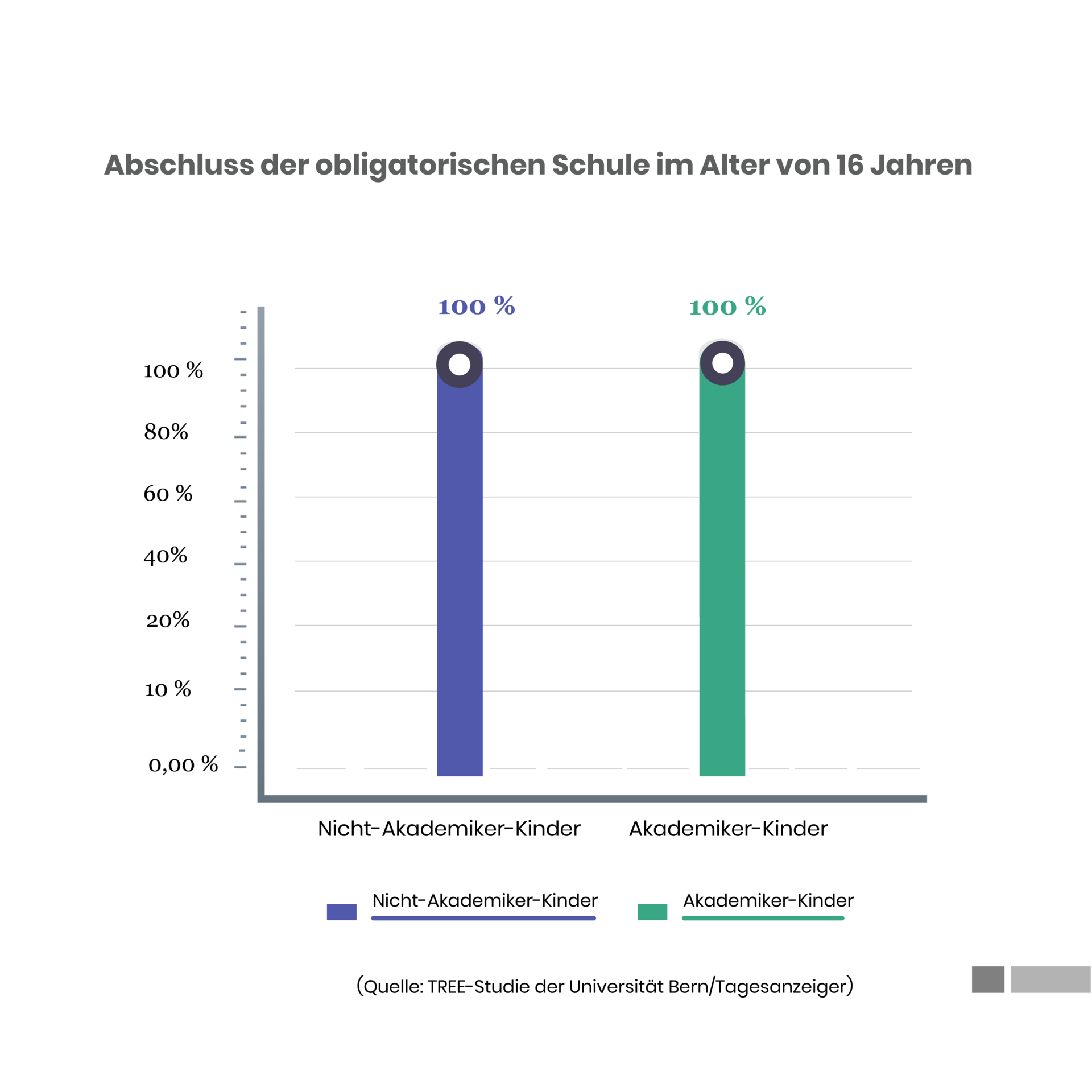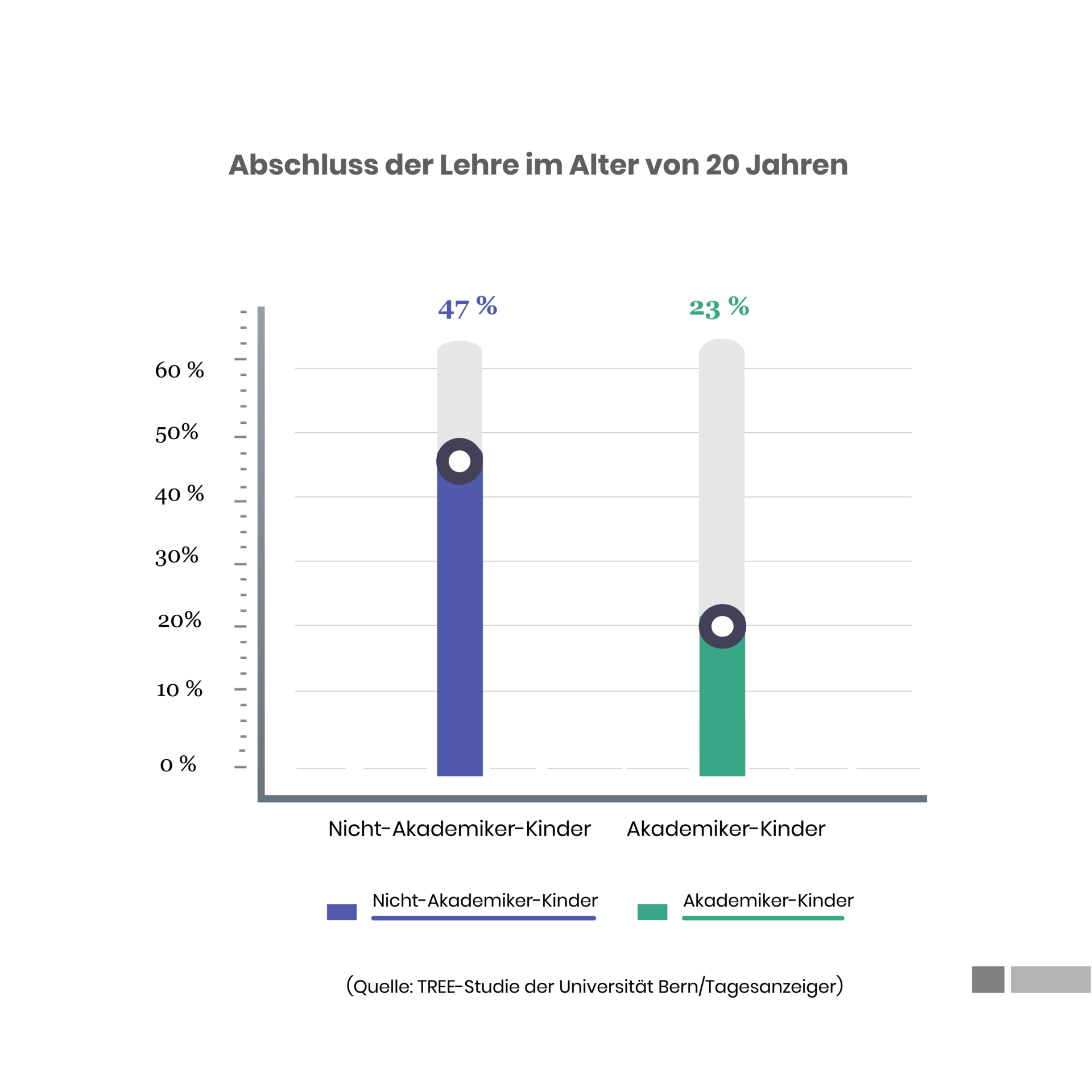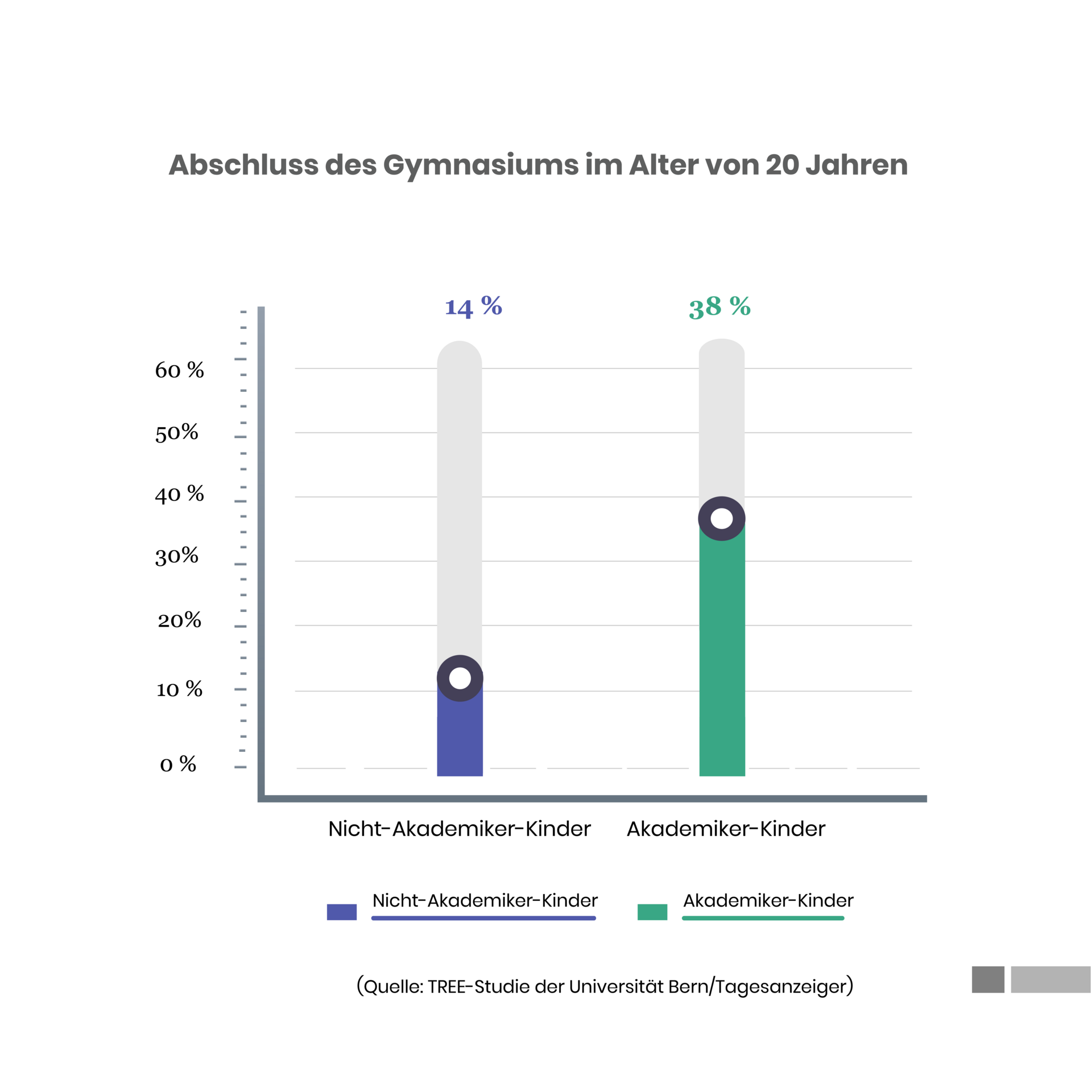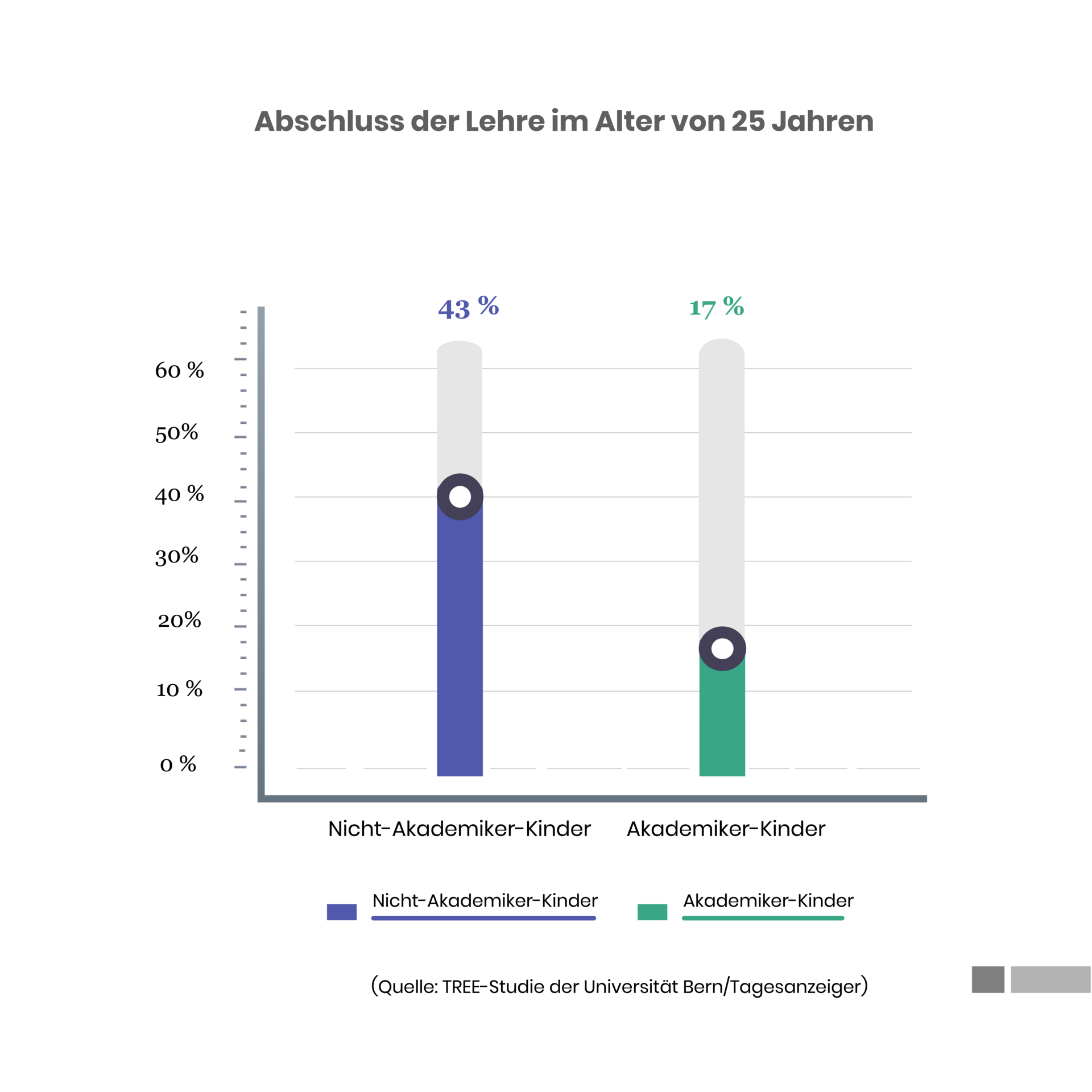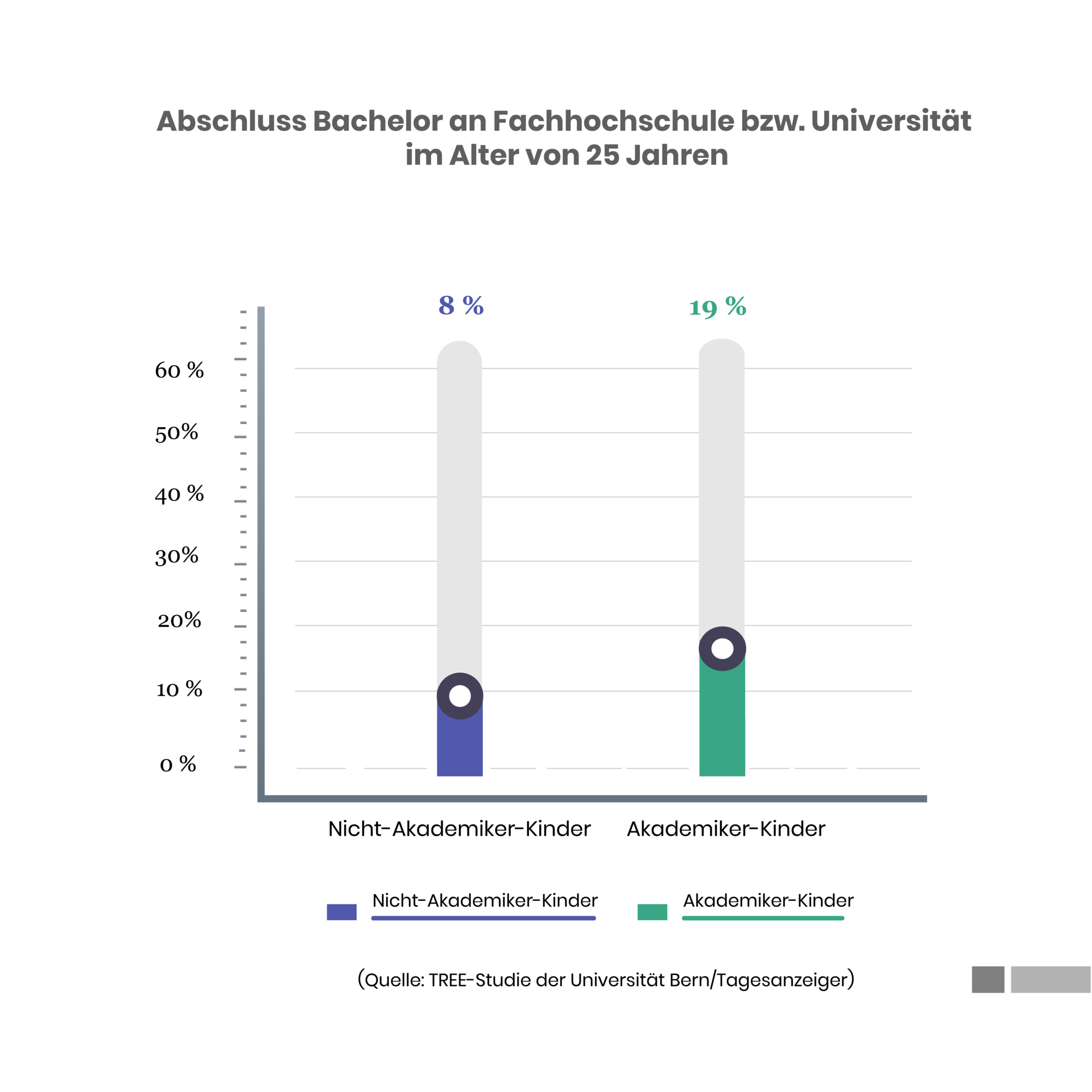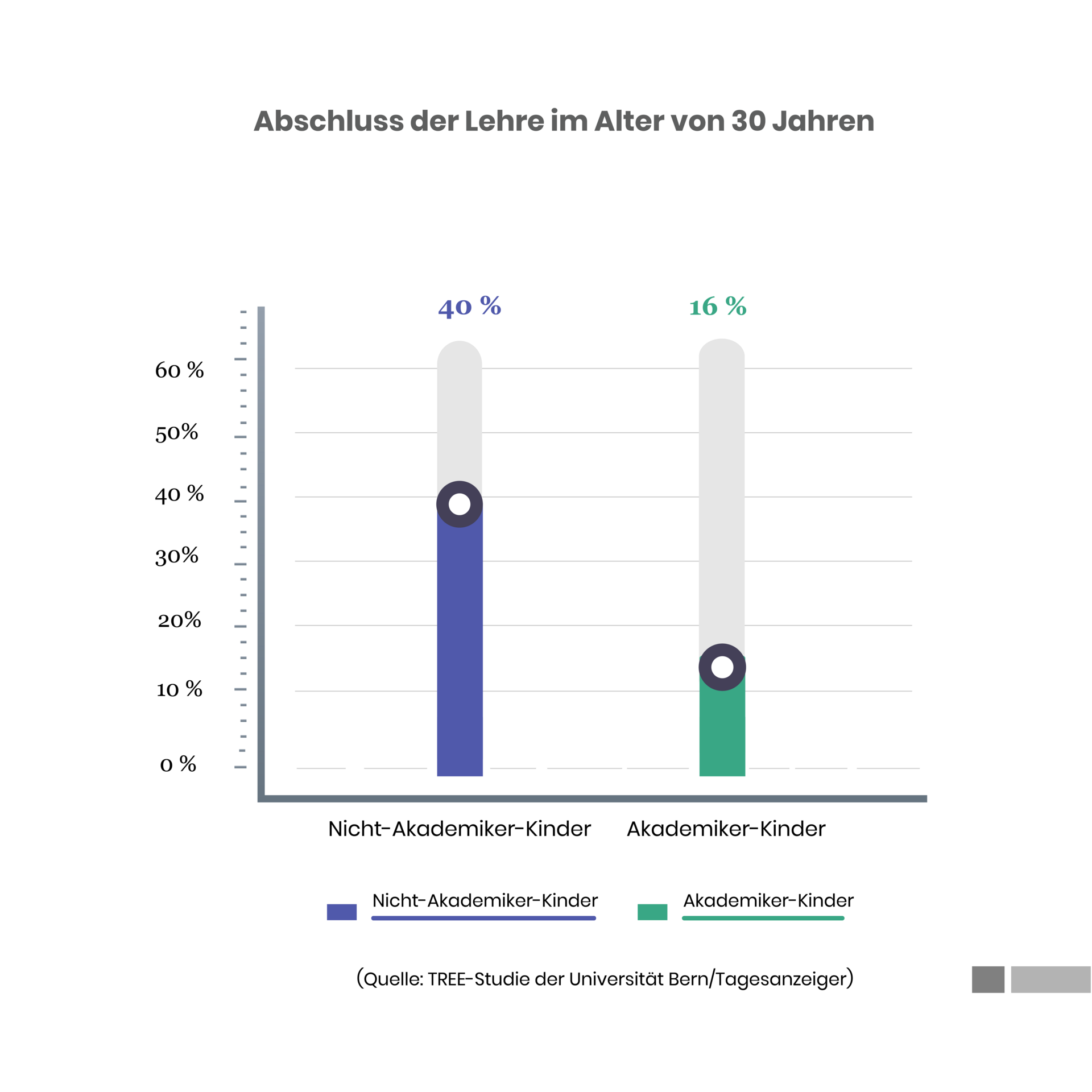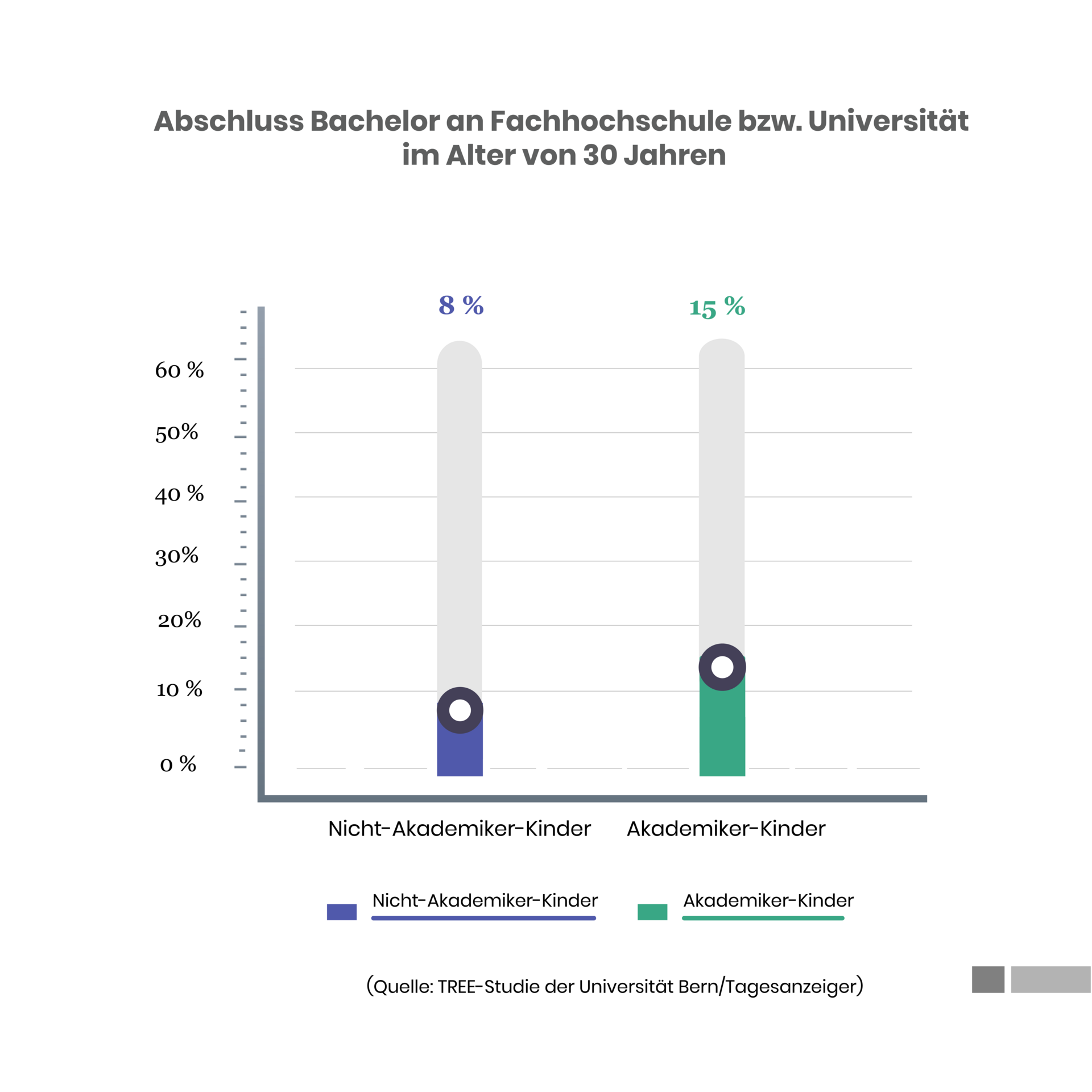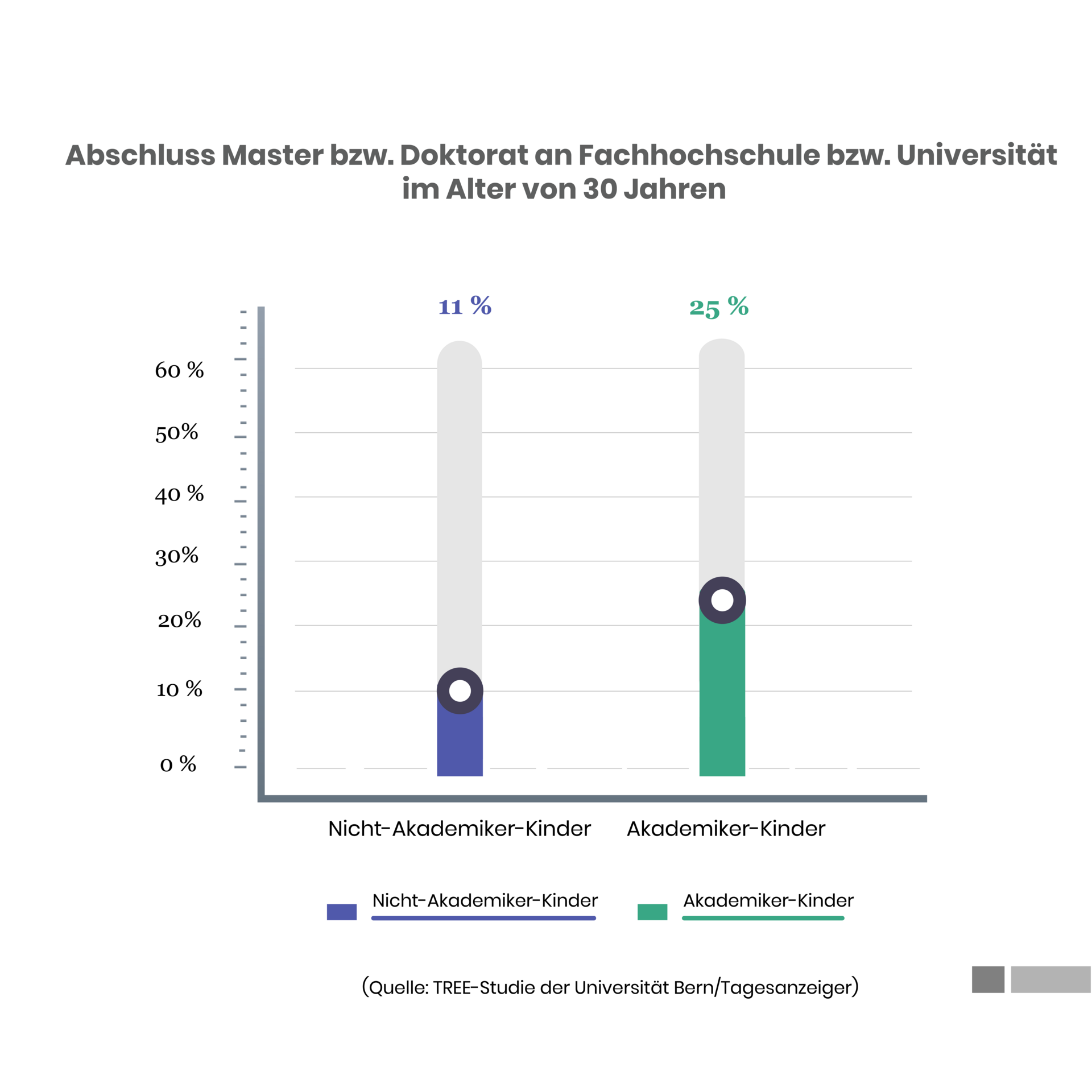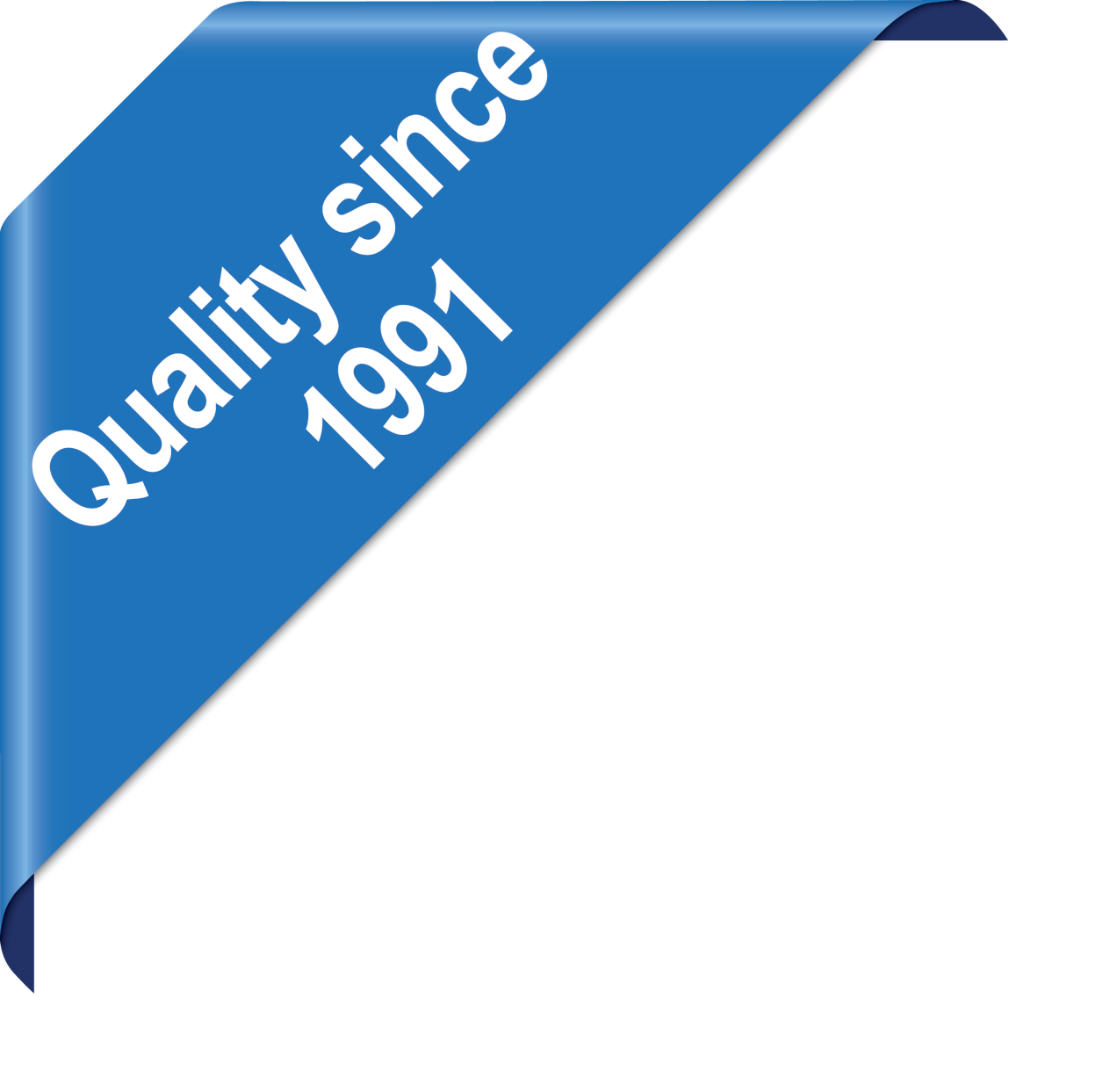

Equal or unequal opportunities in education?
The data from the so-called TREE study at the University of Bern could be interpreted as meaning that there is no equality of opportunity in education in Switzerland, but rather inequality of opportunity. For example, the Tagesanzeiger claims that, according to the TREE data, children of academics have twice as many chances of completing a university degree as children of non-academic parents.
However, it should at least be questioned whether, given the opportunities for support and scholarships and the initiative of the individual, it is not a question of the parents’ education, but rather of the right approach and the individual’s own desire, as to how high the chances are of completing a university degree.
In the following article, we explain what is meant by equality of opportunity (definition), present the study data on inequality of opportunity in Switzerland, question the conclusions drawn from the TREE study and show the advantages of an academic degree at a university, a teacher training college or a Swiss Federal Institute of Technology.
Advantage of preparatory courses for the gymnasium!
Table of contents
- Definition of equal opportunities or unequal opportunities in education
- Study data on equal opportunities in the Swiss education system
- Questioning the conclusions of the TREE study
- Advantages of an academic degree at a university, ETH or PH
Definition of equal opportunities or unequal opportunities in education
The inequality of opportunities in the educational system was recognised as a major social problem for the first time in modern times with the idea of equality of the French Revolution. As a solution, a free school system was introduced in France in 1793, whereby school attendance became compulsory for both boys and girls. The equality of opportunities was already considered at that time as a prerequisite to be able to claim one's civil liberties and to fulfil one's civic duties.
There are various approaches to defining the terms equality of opportunities and, conversely, inequality of opportunities in the absence of the defining criteria.
According to one definition by the German sociologist Prof. Dr Stefan Hradil, equality of opportunities exists when "the acquisition of educational degrees and the resulting distribution of life chances [takes place] [...] exclusively on the basis of individual performance" (Hradil, Stefan: Soziale Ungleichheit in Deutschland, Wiesbaden 2001, 8th edition, reprint 2005, p. 152.)
Or put differently: equality of opportunities only exists if criteria such as gender, social origin, parents' income, parents' educational level, ethnic affiliation, religion and so on have no measurable influence on the performance and success of the individual in the educational system.
Study data on equal opportunities in the Swiss education system
The fact that equal opportunities in the Swiss education system are in a bad state has been discussed for a long time, for example after the international school performance comparison PISA in 2018.
Now, study data have become known that would confirm the problem of unequal opportunities in the Swiss education system. At least, that is what the Swiss newspaper Tagesanzeiger claims, which has presented numbers from the research data of the TREE study and concluded from them that children of academic parents have better educational opportunities than children of non-academic parents. Specifically, the Tagesanzeiger claims that academic children have twice as good chances of obtaining a university degree as non-academic children.
In the case of TREE (Transitions from Initial Education to Working Life), it is a long-term study of the University of Bern covering the whole of Switzerland, in which the transition (transition) of adolescents from school to adulthood is examined, with the focus on the educational and occupational trajectories after compulsory schooling.
When compulsory schooling ends at the age of 16, academic children and non-academic children are still on a par according to the TREE study data, after which the completion rate in this age group is 100% in each case.
However, at the age of 20, the data from the TREE study already show significant differences in terms of educational attainment. Among non-academic children, 47 per cent complete vocational training, while only 23 per cent of academic children do so. Only 14 per cent of non-academic children complete the gymnasium, compared to 38 per cent of academic children.
At the age of 30, there are also significant differences in the education received at a university of applied sciences and a university. While only 8 per cent of children of non-academics have a bachelor's degree in this age group, the figure is 15 per cent for children of academics. At the age of 30, only 11 per cent of children of non-academics have a master's degree or a doctorate, whereas the figure is 25 per cent for children of academics.
The authors of the Tagesanzeiger article support their thesis that there is a causal link between the TREE study data and educational opportunities in Switzerland with voices from the scientific community, according to which education researcher Prof. Dr Margrit Stamm would explain the differences in educational attainment between children of academics and non-academics by the fact that children in the Swiss school system need the support of their parents to be successful. Non-academic children would be at a disadvantage because their parents are not able to help, either academically or financially by paying for tutoring. There would also be a fear of advancement, which could be caused by discouragement from the parents, who make you believe that you are something better if you want to go to university. Teachers could also be the cause of the fear of advancement if they tell you that you are not up to the requirements of, for example, the gymnasium.
The authors of the Tagesanzeiger article also receive support for their thesis of unequal opportunities from the co-study leader of the TREE study, Dr Sandra Hupka-Brunner, who claims that parents usually want their children to do as well as they did, so that academics parents would want their children to become academics as well and would accordingly promote them.
Questioning the conclusions of the TREE study
Whether the conclusion from the TREE study data by the Tagesanzeiger is tenable, namely that there is inequality of opportunity in the Swiss education system, should at least be questioned. The basic assumption that non-academic parents would not have enough money and therefore could not afford to pay for their children's private tutoring, for example, cannot be generalised. Because even as a craftsman, you can earn very well in Switzerland. As an entrepreneur, the earning opportunities are often even significantly better compared to an employed academic.
Book a Gymnasium preparation course now to increase your child's chances
But even if the parents of non-academic children do not have enough money to support their children, this does not mean that there are no other options for support, such as scholarships. In a comment to the Tagesanzeiger article "The school discriminates against children from non-academic households," it is also stated that the commenting person comes from a non-academic household and has worked in addition to studying full-time, while their non-academic parents considered studying to be too expensive. Working in addition to studying may not be ideal, but this example also shows that initiative and assertiveness towards parents can lead to a person being able to break free from their social background.
It is also often claimed that non-academic parents do not encourage their children to go to the gymnasium. However, initiative is also part of life, and it is therefore always a question of the individual case whether a child shows this initiative and motivates itself to acquire a higher educational qualification than that of its parents.
Another comment on the aforementioned Tagesanzeiger article questions the article's title "The school discriminates against children from households far from education." The wording "far from education" is criticised because parents without a university degree can still have a good education, for example through the vocational maturity examination and a degree from a university of applied sciences. Another person objects to the wording "discriminates" and thinks that the school does not discriminate anyone, but that children are perhaps disadvantaged by their social background.
Advantages of an academic degree at a university, ETH or PH
Anyone who wants to study at a Swiss university, a teacher training college (PH) or a federal institute of technology (ETH), in other words, who wants to obtain an academic degree, needs to have completed the gymnasial Matura. But what are the advantages of an academic degree compared to, for example, a vocational qualification?
One of the advantages of choosing the academic path is that you can take your time to decide exactly which career path you want to follow. Anyone who does an apprenticeship usually has to decide at the age of 16 which specific profession they want to train for. However, if you want to study at a university, ETH or PH, you first have to complete the gymnasium (grammar school) and only then, usually at the age of 18 or 19, decide what you want to study.
Another advantage of being an academic is that one has the chance to get well-paid positions, for example in large companies or in the government, which can also mean a lot of responsibility (for example, responsibility for personnel) and stress, but do not require any entrepreneurial risk, which ultimately means less stress for the employee. To reach an income level similar to that of academics, graduates with an apprenticeship usually have to start their own business, i.e. set up a company with several employees, after completing their apprenticeship. However, this means much more responsibility and stress than being an employed academic, because as an entrepreneur one always bears the risk of going insolvent in the worst case. Compared to this, one is even more protected as an academic in the state, because an insolvency of the state is usually not to be feared. And even in the case of system-relevant companies, one can hope that they will be rescued by the state in the event of insolvency.
It should also be borne in mind that the social reputation of academics is still greater today than that of other qualifications, which can be considered an advantage for some students and parents.
All in all, one can say that the advantage of an academic degree and the possible jobs that come with it lies in the higher security and greater prestige, which can lead to a higher quality of life. The level of earnings is not necessarily decisive here, as one can also earn very well in Switzerland as a craftsman in a leading position or as an entrepreneur, the latter often even better than employed academics.
Book preparatory course for long-term gymnasium
Book preparatory course for short-term gymnasium
Registration for the gymnasium simulation exam
Registration for the gymnasium probation course
Sources :
https://www.pisa-schweiz.ch/pisa-2018/ergebnisse/
https://www.tagesanzeiger.ch/schulstart-chancen-im-schweizer-schulsystem-sindungleich-297911787840
https://www.lern-forum.ch/en/gymnasium-preparation-zurich
https://www.lern-forum.ch/en/gymnasium-preparation-zurich/long-term-gymnasium/registration
https://www.lern-forum.ch/en/gymnasium-preparation-zurich/short-term-gymnasium/registration
https://www.lern-forum.ch/en/gymnasium-preparation-zurich/mock-exam/registration
https://www.lern-forum.ch/en/gymnasium-preparation-zurich/gymi-probation-period-courses/registration

Second-chance education, university: financially worthwhile?
Is a second education financially worthwhile, i.e. via adult grammar school graduation to university, in order to become a lawyer or doctor in your mid-30s?
Teaching artificial intelligence in schools?
Should artificial intelligence be taught in schools? So far, AI is not part of the curriculum. AI skills becoming increasingly important in education, careers.
New Vocational Baccalaureate Regulation 2026: key changes
New Vocational Baccalaureate Regulation 2026 come into force 1 March 2026. We outline the key changes here, including the Vocational Baccalaureate 2030 project.


